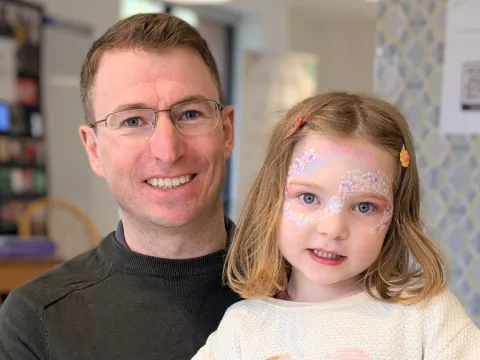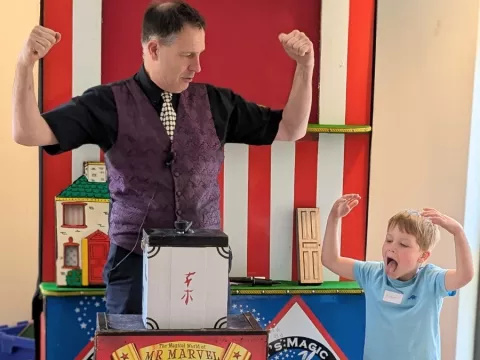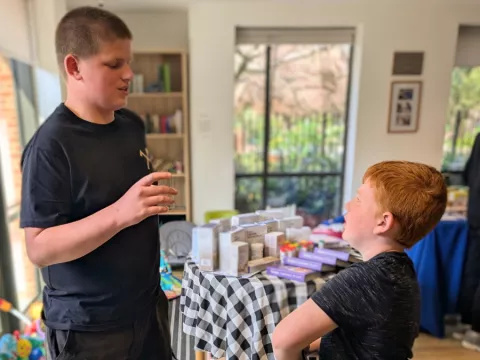An egg-stra special Easter party for children with rare diseases
Thursday 17 April 2025

Children with rare metabolic conditions were treated to an Easter party with a twist recently at Evelina London’s Ronald McDonald House.
The paediatric inherited metabolic diseases (IMD) service at Evelina London Children’s Hospital organised their annual Easter party for children and young people living with IMDs. Children with these conditions have to eat a low-protein diet and, without the party, would miss out on the excitement of Easter chocolates.
Inherited metabolic diseases are a group of rare disorders that can lead to a dangerous imbalance of chemicals in the body. These can result in organ damage and long-term complications, including neurological issues.
Some of the children attending the party live with phenylketonuria (PKU), a rare metabolic disorder. People with PKU cannot break down phenylalanine, which is an amino acid found in protein in foods. This means that the amino acid can build up in the body to levels that are toxic to the brain. PKU is diagnosed by the newborn blood spot test (formally called the heel prick test).
PKU is a treatable condition, but if not correctly managed it can result in severe and irreversible brain damage. As part of the treatment, children submit weekly finger prick tests to the IMD team at Evelina London who monitor the results and contact the family if they need to modify their food intake.
This ability to provide continuous, remote testing makes it easier for children who live further away such as 5-year-old Roman Norris who lives on the Isle of Wight. Roman has a tube fitted to deliver medicine directly into the stomach. He has been coming to Evelina London since birth and the family still travel to London for a face-to-face appointment every 6 months.
Chloe, Roman’s mum, said: “This is the first time we have attended the party and its been fantastic. Roman is the only child on the island with PKU so events like this really help Roman feel there are other children like him.”

The party included a visit from the entertainer, Mr Marvel, who kept the children laughing with his mix of magic and songs. There was also an appearance by an Easter bunny, complete with a basket of protein-free chocolate eggs.
The party was not only a time for enjoying music and good food, it was also a chance for families to chat to each other, find new tips and share techniques for living with rare IMDs.

One patient, 14-year-old Josh Todd, shared his story of how he balances managing his condition with maintaining his active lifestyle, practising taekwondo, playing rugby, and recently completing his Bronze Duke of Edinburgh and Gold Chief Scout awards. He has also raised over £200 for The National Society for Phenylketonuria.
Josh is also a great advocate for children and young people with PKU to get into the kitchen and practice their cooking skills.
Josh said: “I say get into the kitchen as soon as possible. PKU is my superpower. It may be annoying at times but keep pushing, keep learning and you can get through it. You can still do anything you want.”
Arlene Slabbert, metabolic paediatric dietitian in the inherited metabolic disease team said: “Any party or celebration can be hard for a child on a low protein diet and their whole family too as many people may not think of chocolate and cake as being too high in protein. Children with PKU are only allowed a few grams a day so the children loved all the low protein chocolate treats at the Easter party.
“Coming together meant that children could see they are not alone and they had the opportunity to make friends with someone that is on the same diet.”
More about Evelina London inherited metabolic disease service
Evelina London is one of the main IMD centres in the UK, offering treatment to patients with all types of IMD. This includes procedures for diagnosis, short-term management and long-term management.
Find out more about Evelina London’s inherited metabolic disease service and the range of conditions we treat.
Last updated: April 2025
Contact us
If you're a journalist and have a media enquiry, please contact us.
Phone: 020 7188 5577
Email: [email protected]



